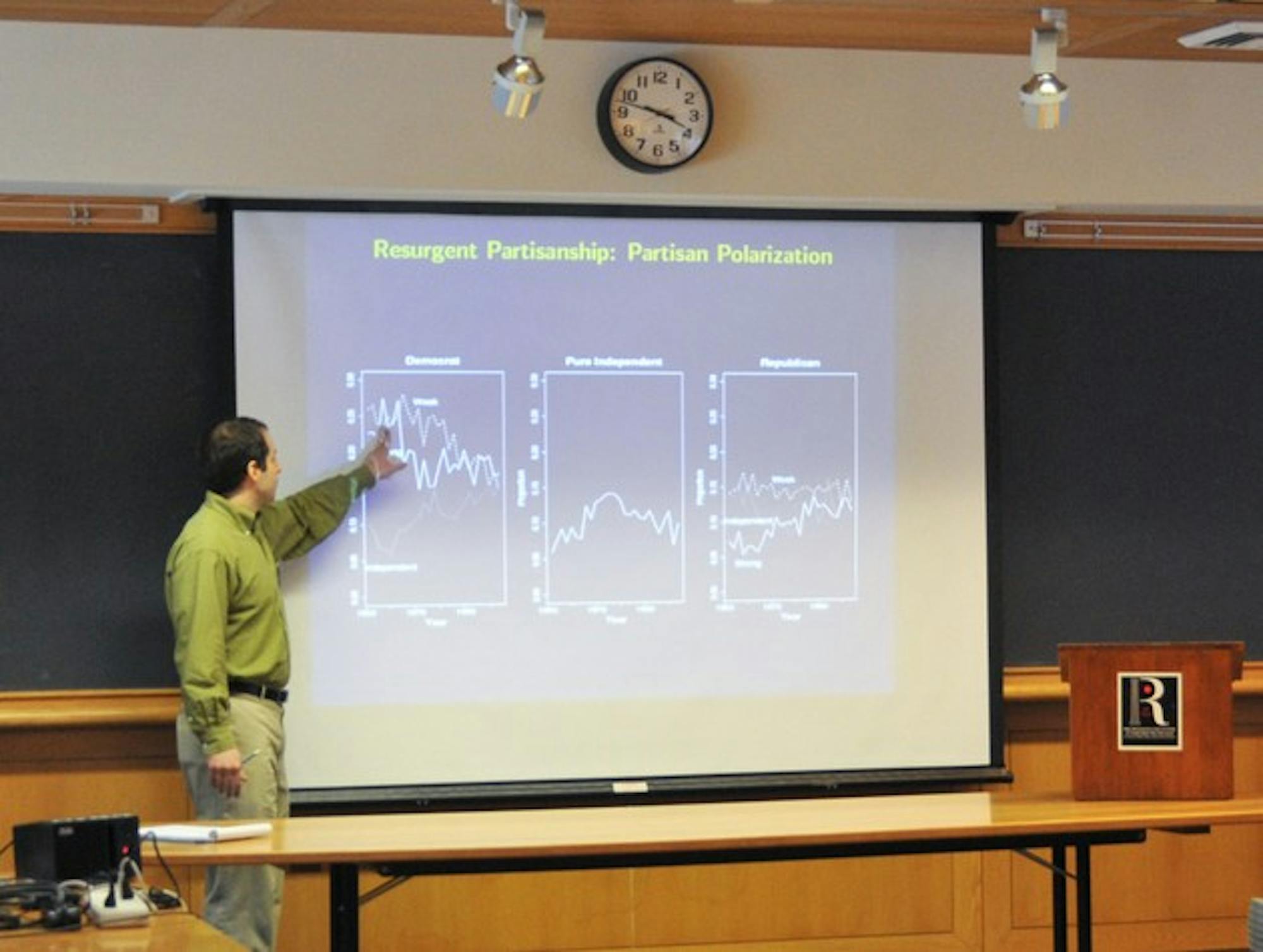This phenomenon may contribute to students' disaffection with politics, Shaiko said.
"It's always struck me that if there's a majority of students, they're in the moderate range, and yet they're bombarded from the left and the right," he said. "That's not exactly the best way to be socialized into politics -- hearing extreme voices on either side and no one really reflecting how you feel."
Thursday's session featured presentations by Dartmouth government professor Joseph Bafumi and Emory University professor Alan Abramowitz, with Dartmouth government professor Dean Lacy serving as the discussant. E.J. Dionne, an affiliate with The Washington Post and professor at Georgetown University, delivered a lecture to the participants at dinner.
Bafumi argued that ideology has become an increasingly strong predictor of party affiliation. This development reduces the likelihood of split-ticket voting, when an individual votes for candidates from both of the major parties in one election, he said.
"I'm finding that today's partisanship is more ideological than partisanship of the past," Bafumi said in an interview. "Moderates still exist, but there are fewer of them. That's both true of elected officials, and there seem to be fewer in the electorate too."
Abramowitz came to a similar conclusion.
Lacy, critiquing the papers, asked the authors to provide supporting evidence for their arguments.
"The theory in both papers is that you have ideology or issue positions, which causes party [identification], which then causes evaluations of either the economy or presidential performance or anything else," Lacy said. "Are you sure that this is the right model, and how can you prove it?"
Friday's presentations examined the effects of polarization on Congress, the presidency and the judicial system. Former Rep. Nancy Johnson, R-Conn., argued that growing polarization in the House -- increased by the influence of outside organizations and interest groups -- discourages members from crafting bipartisan legislation.
"When you look at the conflict between the essential need of each party to be able to appeal to the independent voters and their need within the process to control everything so they don't tick off one of their existing groups of supporters, you can see the tension that the process of policymaking is now fraught with," Johnson said.
Peter Burns, a research associate at the Rockefeller Center, served as Saturday's discussant, asking the conference's participants whether the electorate or the parties are primarily responsible for the polarization.
"I wonder about the direction arrow," he said. "Is the direction arrow that the people are becoming more polarized and, therefore, Congress is reflecting this, or is it that the parties and Congress are becoming more polarized and then the people are the dependent variable?"
The conference is part of the 25th anniversary celebration of the Rockefeller Center. The majority of the center's programming focuses on students, Shaiko explained, so the senior leadership decided to have one faculty-centered event as part of the celebration.
"I think the theme of going to extremes is very fitting in the Nelson A. Rockefeller Center, as the term 'Rockefeller Republican' refers to a branch of the Republican party that is much more moderate to liberal than where the contemporary party leadership is today," Shaiko said.
Shaiko solicited submissions from researchers last year and chose the 14 topics that complemented each other, he said. Shaiko will edit the papers into one volume for publication, which he hopes professors will use in their introductory government and public policy courses, he said.
"The papers presented now have some rather sophisticated models in them," Shaiko said. "What I will tell [the researchers] after the conference is, 'Now make that readable to a student who doesn't know how to read multiple regression.'"
The Rockefeller Center hopes to sponsor additional collaborative conferences, spanning a range of disciplines, in the future, Shaiko said.
"This conference tends to be drawing only among the political community," he said. "Hopefully, in the future we'll have more process-oriented kinds of things, and we could draw on economists, sociologists, all disciplines."




